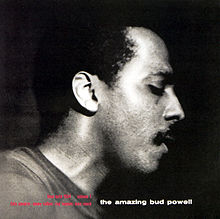|
The Amazing Bud Powell Volume 1
Having decided to review a Bud Powell album, the challenge is, Which one? There are so many to choose from, and they’re all amazing. This reviewer’s choice of The Amazing Bud Powell, Volume One, released in 1952, was made not because it was the pianist’s first recording. That would have made the choice a 1944 date with trumpeter Cootie Williams’ Sextet. Nor was it even Powell’s first recording as a leader, which would have made it the eponymous Bud Powell Trio album, recorded in 1947. No, the reviewer made a self-serving choice here. I chose this one because it includes the Powell original Un Poco Loco, a special favorite of mine for its melodic and rhythmic sophistication. Truth is, there are no wrong choices among the recordings of Bud Powell, and any student of jazz would be well advised to explore all of the recordings of Bud Powell—easily one of the most influential pianists in the history of modern jazz—many of which recordings are now available in compilation form. Powell’s place in the jazz galaxy can hardly be overstated. He was a genius, the Charlie Parker of piano, and a brilliant composer. He was a contemporary (and friend) of Thelonious Monk, but declared that his greatest influence on piano was Art Tatum. He had a right hand that was described as lightning fast, a dazzlingly melodic way of improvising, and a rhythmic complexity that nonetheless flowed naturally. In the course of his career, Powell’s playing underwent style changes and, near the end, as his health went downhill, there was sometimes a certain raggedness about it—but it was always right. The Amazing Bud Powell, Volume One is the product of two separate recording sessions, one of a quintet on August 9, 1949, the other of a trio on May 1, 1951. Originally released on the Blue Note label in 10-inch LP form, the album, not surprisingly, has been re-released a number of times, most recently in 2001, again on the Blue Note label, now digitally remastered by Rudy Van Gelder (an RVG Edition) with 20 tracks, nine of which represent bonus alternate takes. Along with Powell on the 1949 date are the pioneering bop trumpeter Fats Navarro, a 20-year-old Sonny Rollins on tenor sax, bassist Tommy Potter, and drummer Roy Haynes. The trio date in 1951 included bassist Curley Russell and drummer Max Roach. As the leader on both the recording dates, Powell’s playing is naturally showcased. But what a treat to hear Fats Navarro—a bebop icon who died way too young—along with Sonny Rollins and Roy Haynes, both of whom are still alive, still playing, and whose evolving approaches to the music we’ve been able to witness over all these years. Not to mention Max Roach, who many consider to have been the greatest drummer in jazz history. The original Powell compositions recorded here are bebop classics, and wonderful to hear. But the album also more than does justice to compositions by Bird, Dizzy and Monk as well as some hand-picked gems from the Great American Songbook. I’m hardly the first to note that this is bop at its highest level. And if you have any real interest in jazz, this album belongs in your collection. Be warned, though: Bud Powell can be addictive. (“Betcha can’t hear just one!”) —Terry MacDonald Track Listing
Audio CD(July 3, 2001) Original Release Date:1951 Number of Discs:1 Format:Original recording remastered, Extra tracks Label:Blue Note ASIN:B00005LANK |
Copyright ©2024 Seacoast Jazz Society, All Rights Reserved



